How will oil affect Madagascar's environmental riches?
- Published
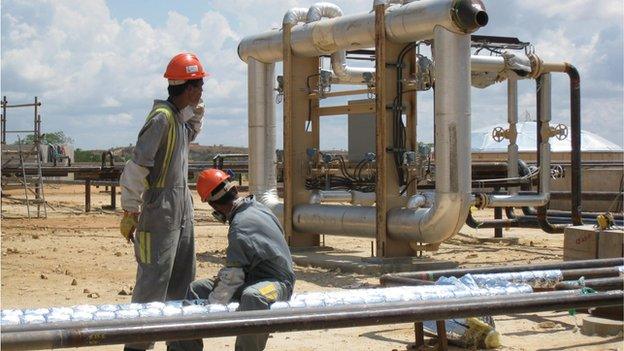
Amid the hills of western Madagascar, villagers have long been aware of a thick sticky substance naturally seeping out of the ground.
But it is only recently that these unconventional oil deposits in the region of Melaky have attracted the attention of investors.
The rising prices of oil on world markets, coupled with new technologies aim to turn the Indian Ocean island - famous for its unique habitat and wildlife - into a significant oil producer.
Tsimiroro is extremely remote - even by the vast island's standards - and most of Madagascar Oil's estimated 100 employees are flown by small plane from the capital, Antanarivo, 300km (about 185 miles) to the east of the oil field.
"Currently I work three weeks on the site and get one week off," says a 48 year old oil worker as he arrives at Tsimiroro airstrip after a week in Antananarivo with his wife in children.
Tsimiroro, south of the town of Morafenobe, has proven reserves of 1.7bn barrels of heavy oil - buried some 100m to 200m beneath the mountainous region.
"Our main objective now is to demonstrate that this oil is a world class asset with a great commercial value," says Laurie Hunter, the British CEO of Madagascar Oil, which has oil concessions totalling 30,000 sq km in the region.
Oil is already being pumped in Tsimiroro but only on a very small scale.
A few dozens of barrels a day are produced - with the objective of reaching 1,000 barrels a day during 2013.
But unlike light crude oil, the hydro carbon in Tsimiroro is hard to extract.
A pilot scheme is due to start in November designed to validate high-tech methods needed to extract it.
The new technology is able to inject steam into the ground to soften the oil.
Commercial exploitation may still be years away, but the prospects of oil being produced in the impoverished country has raised a mix of expectations and concerns among Malagasy people.
Saving trees?
In a nearby village, where piglets wonder the streets and subsistence farming is the main means of living, some are already benefiting in terms of jobs - one man said he was working as a security guard.
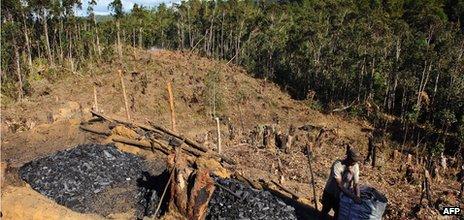
The charcoal industry has devastated Madagascar's rain forests
Bushes and small trees in the village bear the marks of machetes where branches have been cut away.
Deforestation - often for the purposes of making charcoal for domestic use - is a major environmental issue facing Madagascar. It is estimated that rain forests have shrunk to less than a quarter of their former size.
Some argue that oil could play a part in helping the island deal with this threat.
By boosting the economy, electricity could be installed and the production of local oil products could halt the use of charcoal.
However, sceptics say as the oil is essentially for export, the likelihood of a local refinery is slim.
For Voaary Gasy, a coalition of non-governmental organisations, the worry is more about the possible risks of pollution as the steam injected into the underground is mixed with solvents.
"We are also concerned by the lack of transparency and the potential pressure on water resources induced by the use of steam technology," says Andry Ralamboson, the national co-ordinator for Voaary Gas.
But Madagascar Oil, which has its headquarters in Texas, says its technology is safe and clean and the steam injection for the Tsimiroro site in is not mixed with chemicals.
The company also highlights the fact that most of the water used for the steam injection process will be recycled.
The World Wide Fund for Nature (WWF), which has been facilitating consultations between the Malagasy government, oil companies and local communities, believes Tsimororo - although not an ecological priority - represents a potential threat in terms of water consumption and contamination.
But Martin Nicoll, the WWF Madagascar representative, says current oil and gas projects present no significant risks in comparison to the controversial tar sand deposits further north, whose exploitation has been ruled out for now because of possible water pollution.
The prospect of large quantities of natural gas being found offshore could be a more serious threat because of the potential influx of people and the pressure on the coastal environment, he says.
Oil and gas could offer important development opportunities provided they are well managed, he adds.
'Going backwards'
For Madagascar Oil, its next key step is to make what is called a "declaration of commerciality" - which will show the project is viable and will help attract bigger investors and partners for future production.
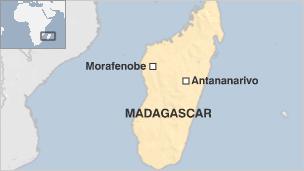
The oil company's management hopes to benefit from the global rush triggered by recent discoveries of oil and natural gas in East Africa and the Indian Ocean nations.
However, a number of political analysts, NGOs and business executives in Antananarivo believe that the country is ill prepared to face a potential oil and gas bonanza.
Some point out that the discovery of oil and precious minerals in other African countries has more often led to corruption and conflict than prosperity.
The unstable country is still under a transitional authority following a coup in 2009.
"Since then, we have gone 10 years backwards," says Josephine Andriamamonjiarison, the head of the main employers' association in the country, GEM.
The political uncertainty has made investors nervous about signing deals when it is not certain who will honour them and for how long.
Elections are due to be held next year.
But it is still unclear - despite the recommendation of the regional body Sadc which is mediating the crisis - whether the man in power, Andry Radjoelina, will allow ousted President Marc Ravalomanana, home from exile in South Africa to participate in the polls.
Only with a democratic government in place will international recognition return and with it the island's economic revival.
Correction 29 October 2012: This story has been amended to make it clear that WWF says the Tsimororo oilfield may pose an environmental threat.
- Published10 September 2012
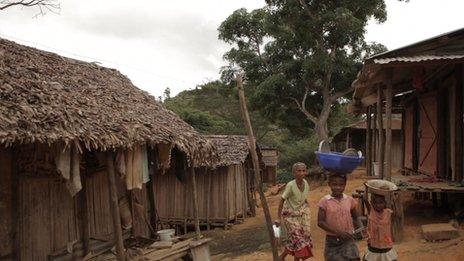
- Published1 December 2023
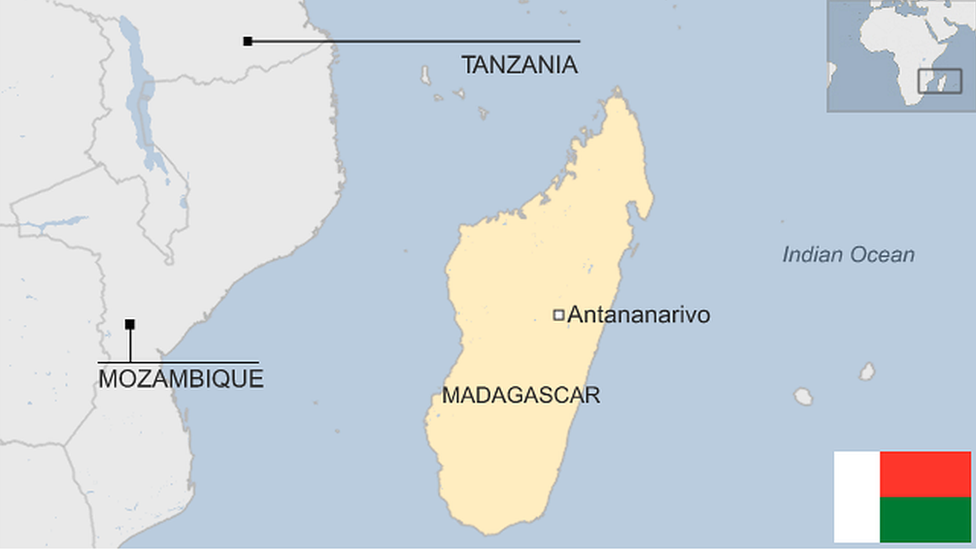
- Published28 June 2011
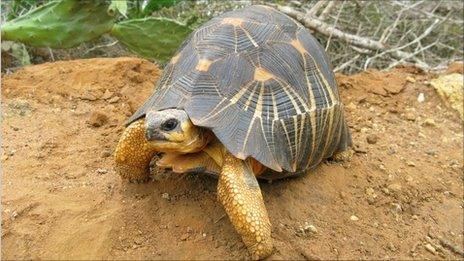
- Published29 July 2010